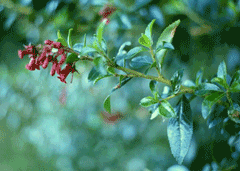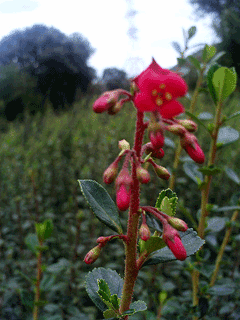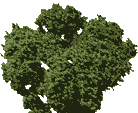 |
|
http://commons.wikimedia.org/wiki/User:Franz_Xaver |
 |
|
Translate this page:
Summary
Bloom Color: Purple, Red. Main Bloom Time: Early summer, Early fall, Late summer, Late spring, Mid summer, Mid spring. Form: Rounded.
Physical Characteristics

 Escallonia rubra is an evergreen Shrub growing to 3.5 m (11ft 6in) at a fast rate.
Escallonia rubra is an evergreen Shrub growing to 3.5 m (11ft 6in) at a fast rate.
See above for USDA hardiness. It is hardy to UK zone 8. It is in leaf all year, in flower from June to October. The species is hermaphrodite (has both male and female organs).
Suitable for: light (sandy), medium (loamy) and heavy (clay) soils and prefers well-drained soil. Suitable pH: mildly acid, neutral and basic (mildly alkaline) soils. It cannot grow in the shade. It prefers dry or moist soil. The plant can tolerate maritime exposure.
UK Hardiness Map
US Hardiness Map
Synonyms
E. macrantha.
Plant Habitats
Hedge;
Edible Uses
References More on Edible Uses
Medicinal Uses
Plants For A Future can not take any responsibility for any adverse effects from the use of plants. Always seek advice from a professional before using a plant medicinally.
None known
References More on Medicinal Uses
The Bookshop: Edible Plant Books
Our Latest books on Perennial Plants For Food Forests and Permaculture Gardens in paperback or digital formats.

Edible Tropical Plants
Food Forest Plants for Hotter Conditions: 250+ Plants For Tropical Food Forests & Permaculture Gardens.
More

Edible Temperate Plants
Plants for Your Food Forest: 500 Plants for Temperate Food Forests & Permaculture Gardens.
More

More Books
PFAF have eight books available in paperback and digital formats. Browse the shop for more information.
Shop Now
Other Uses
Hedge Hedge
Very tolerant of extreme maritime exposure, making a very good windbreak hedge[75]. Tolerant of regular and severe pruning, it can regenerate from the base if cut back by frost[200].
Special Uses
Espalier Hedge Hedge
References More on Other Uses
Cultivation details
Landscape Uses:Border, Erosion control, Espalier, Foundation, Massing, Specimen. Prefers an open sunny position and a soil that is not too rich, an ordinary sandy loam will suffice[11]. Succeeds in dry soils. Tolerates lime[200]. Very tolerant of maritime exposure[184]. A polymorphic species, there are many named varieties. Only hardy in the milder areas of Britain, tolerating temperatures down to about -10°c[184]. Plants resent root disturbance and should be placed in their final positions as soon as possible[200]. Special Features:Not North American native, Attractive flowers or blooms.
References Carbon Farming Information and Carbon Sequestration Information
Temperature Converter
Type a value in the Celsius field to convert the value to Fahrenheit:
Fahrenheit:
The PFAF Bookshop
Plants For A Future have a number of books available in paperback and digital form. Book titles include Edible Plants, Edible Perennials, Edible Trees,Edible Shrubs, Woodland Gardening, and Temperate Food Forest Plants. Our new book is Food Forest Plants For Hotter Conditions (Tropical and Sub-Tropical).
Shop Now
Plant Propagation
Seed - we have no details on this plant but suggest sowing the seed in early spring in a cold frame. When they are large enough to handle, prick the seedlings out into individual pots and grow them on in the greenhouse for at least their first winter. Plant them out into their permanent positions in late spring or early summer, after the last expected frosts. Cuttings of half-ripe wood, July/August in a frame. Either put the cuttings in individual pots or pot them up as soon as they start to root. Easy[K]. Cuttings of mature wood in winter. Very easy, just plant the cuttings direct into their final positions, about 95% usually take[29, K]. Keep them moist in a dry spring.
Other Names
If available other names are mentioned here
Native Range
SOUTHERN AMERICA: Chile
Weed Potential
Right plant wrong place. We are currently updating this section.
Please note that a plant may be invasive in one area but may not in your area so it's worth checking.
Conservation Status
IUCN Red List of Threatened Plants Status :

Growth: S = slow M = medium F = fast. Soil: L = light (sandy) M = medium H = heavy (clay). pH: A = acid N = neutral B = basic (alkaline). Shade: F = full shade S = semi-shade N = no shade. Moisture: D = dry M = Moist We = wet Wa = water.
Now available:
Food Forest Plants for Mediterranean Conditions
350+ Perennial Plants For Mediterranean and Drier Food Forests and Permaculture Gardens.
[Paperback and eBook]
This is the third in Plants For A Future's series of plant guides for food forests tailored to
specific climate zones. Following volumes on temperate and tropical ecosystems, this book focuses
on species suited to Mediterranean conditions—regions with hot, dry summers and cool, wet winters,
often facing the added challenge of climate change.
Read More
Expert comment
Author
(Ruiz.&Pav.)Pers.
Botanical References
11200
Links / References
For a list of references used on this page please go here
Readers comment
© 2010, Plants For A Future. Plants For A Future is a charitable company limited by guarantee, registered in England and Wales. Charity No. 1057719, Company No. 3204567.